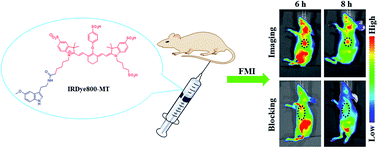Development of a novel melatonin-modified near-infrared fluorescent probe for in vivo hepatocellular carcinoma imaging
Abstract
Hepatocellular carcinoma (HCC) is a common malignancy worldwide with poor prognosis. The early identification and precise resection of HCC are essential for improving the prognosis and overall survival of patients. In clinical practice, fluorescence imaging is a powerful technology to identify and remove HCC lesions, but accurate and reliable detection of HCC continues to remain a challenge due to non-specificity and false-positive uptake of probes. To circumvent these problems, it is crucial to design a specific probe for the accurate detection of HCC. Herein, we reported the design and synthesis of an NIR fluorescent probe by conjugating IRDye800CW with melatonin, which plays a significant role in the HCC development. The in vivo imaging revealed that IRDye800–MT was uptake specifically by the HCC tumor with a high tumor-to-background ratio. These results demonstrated that IRDye800–MT might hold clinical potentials for future diagnosis of HCC patients.



 Please wait while we load your content...
Please wait while we load your content...